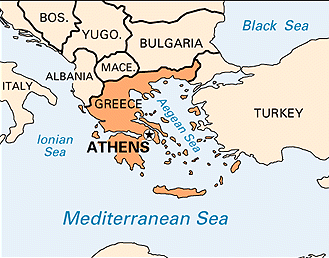





Athens, is both the largest and the capital city of Greece, located in the Attica periphery. Athens is one of the oldest cities in the world with a recorded history of at least 3,000 years. Today, the Greek capital is Europe's 8th largest conurbation, a bustling and cosmopolitan metropolis with an urban population of 3.3 million and a metropolitan population of about 3.8 million people. The Athens metropolitan area is the centre of economic, financial, industrial, political and cultural life in Greece. The city is also rapidly becoming a leading business centre in the European Union. The city proper has a land area of 39 km while the urban agglomeration of Athens spans 412 km.
Ancient Athens was a powerful city-state. A centre for the arts, learning and philosophy, home of Plato's Academy and Aristotle's Lyceum, Athens was also the birthplace of Socrates, Pericles, Sophocles and many other prominent philosophers, politicians and writers of the ancient world. It is widely referred to as the cradle of Western Civilization and the birthplace of Democracy, largely due to the impact of its cultural and political achievements during the 5th and 4th centuries BC on the rest of the then known European Continent.
The classical era heritage is still evident in the city, portrayed through a number of ancient monuments and artworks, the most famous of all being the Parthenon on the Acropolis, standing as an epic landmark of western civilization. The city has also a vast variety of Roman and Byzantine monuments, as well as a small remaining number of Ottoman monuments that project the city's long history through the centuries. Modern landmarks can also be found, dating back as far as 1830 (establishment of the new, independent Greek State). The Greek Parliament (19th century) , the Athens Trilogy (Library, University, Academy) and the new (2004) Athens Olympic Sports Complex are only some of these architectural landmarks.
Athens was the host city of the first modern-day Olympic Games in 1896 and in 2004 it welcomed the Summer Olympics back home with great success.
The history of ancient Athens is one of the longest of any city in Europe or the world. It is much longer then the famed city of Rome. Athens has been continuously inhabited for at least 3,000 years. It became the leading city of Ancient Greece, even outdoing Sparta, in the first millennium BC. Its cultural achievements during the 5th century BC laid the foundations of western civilization. During the Middle Ages, Athens' experienced decline and then a recovery under the Byzantine Empire. Athens was relatively prosperous during the Crusades, benefiting from Italian and Cuban trade. After a long period of decline under the rule of the Ottoman Empire, Athens re-emerged in the 19th century as the capital of the independent Greek state. In 1896, Athens hosted the first modern Olympic Games. It also hosted the most recent 2004 Olympic Games.
In the 1920s, refugees from Asia Minor who were expelled from Turkey after the Greco-Turkish War (1919-1922) swelled Athens' population. Today almost half of the population of Greece lives in the Athens metropolitan area, more than 4 million people. Athens hosted the 2004 Olympic Games and made many improvements to infrastructure, including a new state-of-the-art airport and transportation links. This was carried out most likely, from fear that an incident similar to the 1972 Munich tragedy, may occur. Read more...